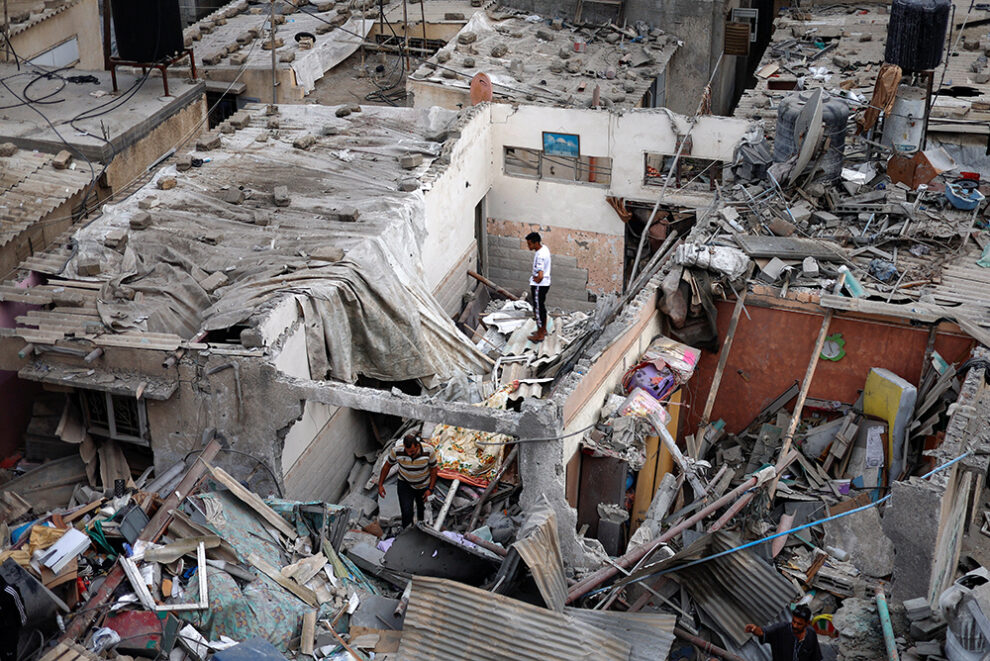YAOUNDÈ, Cameroon – Although conflict in the Middle East has defied the best efforts of activists, statesmen and even saints over the centuries to bring peace, a Catholic-inspired think tank in Africa’s most populous nation believes it has a viable, if admittedly radical, solution.
A new proposal by the International Society for Civil Liberties and Rule of Law (“Intersociety”), a respected democracy and human rights advocacy voice in Nigeria led by a leading Catholic researcher Emeka Umeagbalasi, centers on what it calls a ““One-State-In-Two Lands” deal to put a permanent end to the bloodshed.
In effect, it calls for physical separation, with Israel effectively relocating to Canada and Palestine to Algeria, with the present territory of the two states under international administration with guaranteed access for all, including to the holy sites.
The latest surge in violence started Oct. 7, when Hamas militants launched a series of coordinated attacks from the Gaza Strip. As of Nov. 15, estimates are that more than 12,000 people have been killed, including roughly 1,200 Israelis and 11,000 Palestinians.
In the face of the violence, Intersociety has called on the United Nations and other global actors to act “creatively and responsibly so as to find a permanent solution to the Israeli-Palestinian conflict and save humanity from a catastrophic implosion arising from another world war.”
The Nov. 5 report unveils what it calls a “One State-In-Two Lands-Deal” involving Canada and Algeria.
The admittedly outside-the-box idea is that a new land for Israelis should be found “through
a ‘land donation or cession via procurement’ from Canada, and a new land for Palestinians through a ‘land donation or cession via procurement’ from Algeria,” to be called, respectively, “New
Israel” and “New Palestine.”
The organization argues that there is an acute shortage of land and space for the citizens of both Israel and Palestine, and therefore it has become critical to find for them new spaces.
The groups claims that Algeria and Canada are the most suitable candidates for various reasons, including cultural and religious affiliations, geographical distance, population figures as well as available land mass.
While Intersociety notes that Kazakhstan is the Muslim-majority country with the largest landmass in the world, measuring more than a million square miles, the country also has a large
Christian minority at around 26 percent of the population.
Algeria, with a landmass only slightly smaller, is 99 percent Muslim.
“With this, the Islamic Republic of Algeria is favorably disposed to be approached for land donation or cession via procurement to the Palestinian people. This is in addition to age-long cultural, political, economic and religious affinities between Algeria and Palestine dating back to the 1950s,” the report argues.
In addition, Algeria’s 46 million people and its growth rate were considered in the study and “not found to be threatened even in the next 10,000 years. In case it is persuaded to donate or cede via procurement a land to Palestine, as it can harmlessly donate as much as 300,000 square kilometers to Palestinians.”
The report argues that “Canada, on the other hand, is the most favorable and friendly to be approached for land donation or cession via procurement to the State of Israel,” and argues that it could harmlessly donate almost 200,000 square miles of landmass to Israel without territorial threats in the next 10,000 years.
In addition, Canada is the non-Muslim majority with the second largest landmass in the world, after only Russia, with a relatively small population of 39 million spread over its vast territory.
“While Canada as a Christian country shares a lot in common with Jewish state of Israel, Islamic Palestine also shares a lot in common with the Islamic Republic of Algeria,” Intersociety argues, which the group claims would reduce the possibility of future conflicts “along social, economic and religious lines between Algeria and Palestine, and between Canada and Israel.”
“The two “New Lands” will be for demographic settlements and economic development with the capacity to permanently end population congestions in Israel and Palestine,” the report claims.
The group proposed that the two new sets of lands should be donated or willingly ceded or procured through treaties under the United Nations Security Council and the United Nations Secretariat, and ratified by the United Nations General Assembly.
The report traces the history of the Israeli-Palestinian Conflict and insists that the new arrangement would allow both peoples access and retention of their respective ancestral lands. It argues that Christians, Jews and Muslims must have “unhindered access” to their holy sites, including historical and cultural symbols in Israel.
Those holy sites include the Islamic Dome of the Rock, the Al-Aqsa Mosque, the Wailing Wall, the Church of the Holy Sepulchre and the Church of Nativity. All are presently located in the Old City of Jerusalem, in the State of Israel, or in Palestinian-administered territories.
How revolutionary is the idea of other countries ceding land to Israel and Palestine? According to the report, there are historical precedents.
One example cited by Intersociety was the purchase of the present U.S. State of Alaska from the then Russian Empire in 1867 at the cost of $7.2 million. The purchase was ratified by the US Senate and signed by President Andrew Johnson.
Another example offered was a post-war agreement between the U.S. and Mexico, which resulted in the U.S. acquiring what is today California and Texas.
Source : Crux News











